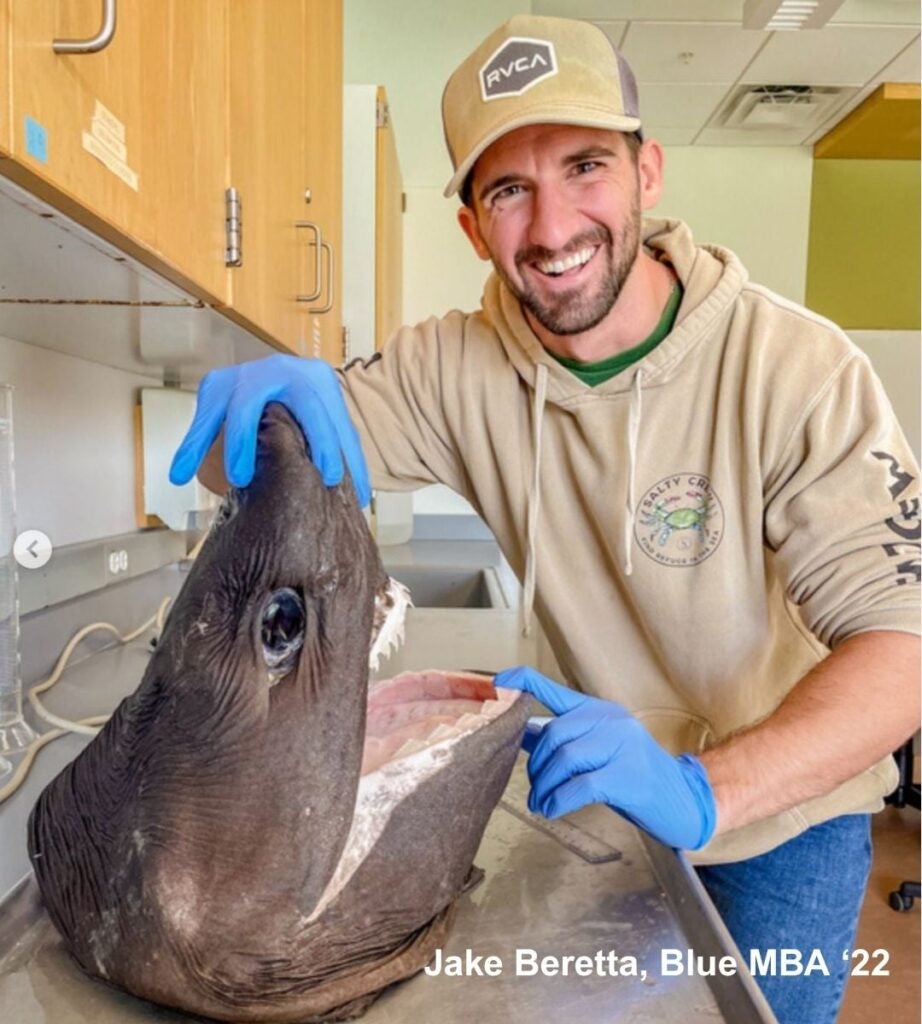Blue M.B.A.
The URI Blue M.B.A. is the first program of its kind in the United States, and provides the knowledge and skills needed to develop business models to ensure an environmentally sustainable world for a broad range of industry sectors, companies and organizations.
Beginning Fall 2026, URI’s Blue M.B.A. is available 100% online, with Blue Economy content integrated into all of the business coursework and a fixed tuition for all students. It is a cohort-based, 2-year, fully online program with one networking-centric residency each June at URI’s Kingston and Narragansett Bay campuses.
For professionals ready to lead the Blue economy, the Blue M.B.A. offers a transformational experience that blends global business expertise with deep ocean and sustainability insight. Students gain access to cutting-edge research, real-world partnerships, and tools to lead across marine policy, climate tech, sustainable finance, and ocean entrepreneurship.
Learn from faculty shaping the future of ocean business, connect with a powerful network of mission-aligned peers, and graduate with the knowledge, credibility, and confidence to make an impact where it matters most.
The College strategically allocates resources to support initiatives and to share knowledge across disciplines in the College, at the University, in the region, and around the world. In the Blue M.B.A. you will apply critical and strategic thinking to current, real-world problems like coastal resilience and ocean innovation opportunities through coursework led by faculty from URI’s internationally recognized Graduate School of Oceanography and Marine Affairs department.
About URI M.B.A. Programs
The URI M.B.A. programs are built on relationships that move Rhode Island forward. We do business that makes a difference for our students, their employers, the community, and the state. The right connections change everything.
The Blue M.B.A. is an extension of this idea. We’re invested in Ocean Health and Ocean Business, and the re-launch includes a fully integrated curriculum that is available 100% online. The ocean connects us outward; community pulls us inward. The tension between global reach and local roots gives URI’s BLUE M.B.A. its unique flavor – its merroir.
Business is personal and connected in the Rhode Island way. And we’re building talent that is relevant everywhere, because Your Success is Our Business.
Where Are They Now?
Meet Jake Beretta, Blue M.B.A. ‘22

We’re proud to highlight Jake Beretta, a graduate of the Blue M.B.A. program, who is now a PhD student at Florida State University, professionally researching marine conservation and fisheries ecology! After graduating, Jake joined Ocean First Institute as Research Staff, conducting field operations and collaborative studies on predators throughout the Florida Keys. He later served as a Biological Technician at Florida State University’s Coastal and Marine Laboratory, conducting fieldwork on critically endangered smalltooth sawfish and contributing to ongoing research on environmental toxin exposure and habitat use. Jake shares, “These roles allowed me to integrate technical field sampling, data analysis, stakeholder engagement, and science communication—skills I first developed during graduate school.”
Jake is currently pursuing his PhD at Florida State University, building upon these experiences by studying the ecology of sharks and rays. In addition to his studies, he teaches undergraduate biology labs, captains research vessels, and serves as a scientific diver—roles that draw directly on the Blue M.B.A.’s emphasis on leadership, operational management, and decision-making in dynamic, real-world environments.
“The URI Blue M.B.A. program profoundly shaped the way I approach marine science and conservation by bridging environmental sustainability with economic practicality. The program’s interdisciplinary structure—linking business strategy with ocean and coastal management—taught me to view fisheries not just as ecological systems, but also as complex economic networks that sustain livelihoods, communities, and industries.”
Jake also completed a Master of Marine Affairs at URI in Spring 2023. He notes that the combination of these two degrees uniquely prepared him to approach marine conservation and fisheries through environmental, economic, and social perspectives, skills that continue to guide his research and collaborations.
